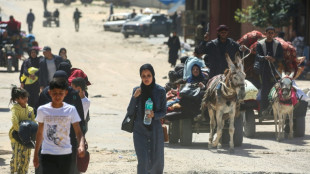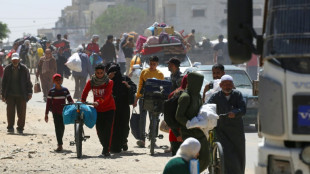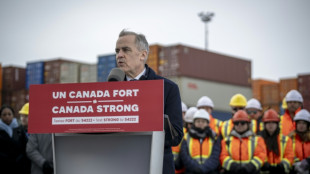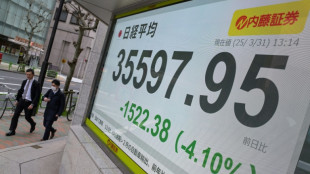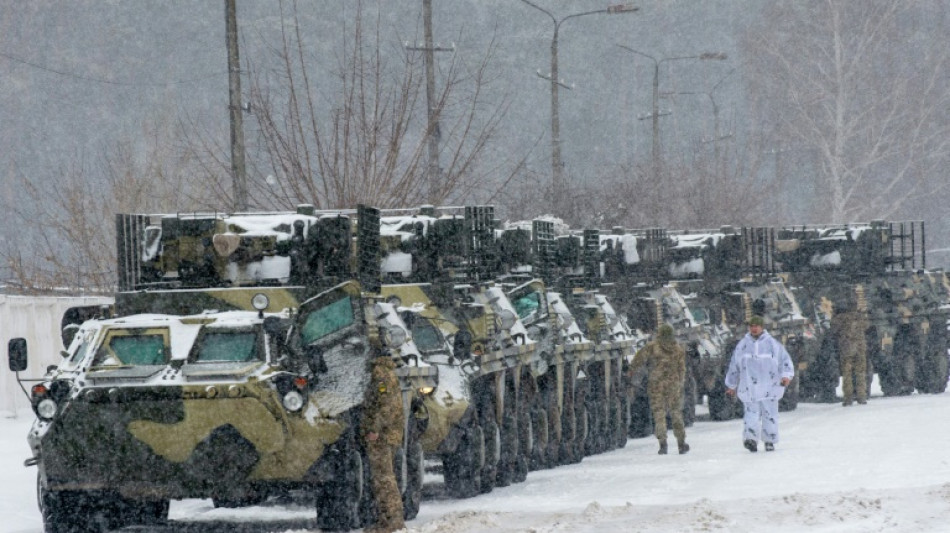
| RBGPF | 1.47% | 68 | $ | |
| CMSC | -0.31% | 22.3934 | $ | |
| AZN | -1.07% | 73.01 | $ | |
| VOD | -1.02% | 9.355 | $ | |
| RIO | -2.38% | 59.61 | $ | |
| NGG | -0.44% | 65.28 | $ | |
| GSK | -0.98% | 38.365 | $ | |
| RYCEF | -2.16% | 9.7 | $ | |
| BP | -0.39% | 33.73 | $ | |
| BTI | 1.59% | 41.165 | $ | |
| RELX | -0.24% | 50.04 | $ | |
| SCS | -0.59% | 11.035 | $ | |
| JRI | 0.26% | 12.904 | $ | |
| BCE | 0% | 22.97 | $ | |
| BCC | -0.11% | 98.195 | $ | |
| CMSD | 0.13% | 22.74 | $ |

Russia, US set for new call amid burst of Ukraine diplomacy
The top Russian and US diplomats were to speak again Tuesday amid intense efforts by NATO allies to prevent an invasion of Ukraine and to show support for Kyiv.
With tens of thousands of Russian troops massed on the Ukrainian border, Tuesday saw another burst of top-level diplomacy to try to head off a major conflict in Europe.
The British and Polish prime ministers were in Kyiv for talks with Ukrainian President Volodymyr Zelensky, as Russian President Vladimir Putin met with the Hungarian leader in Moscow and held a phone call with the Italian prime minister.
The flurry of talks were to culminate later Tuesday with a call between US Secretary of State Antony Blinken and Russian Foreign Minister Sergei Lavrov, who have been spearheading efforts to find a way out of the crisis.
Putin was also to give a press conference with Hungarian Prime Minister Viktor Orban after their talks, and could make his first major comments on the crisis in weeks.
Going in to the meeting with Orban, Putin reiterated that Moscow had sent proposals to Washington for "written commitments" on Russia's demands for security guarantees from the West.
"I would like to assure you that no EU leader wants war or conflict, we are ready for a rational agreement, from the EU side," Orban told the Russian leader.
- 'Toughest sanctions ever' -
Orban, one of Putin's few allies among NATO and EU leaders, made the trip to Moscow in defiance of opposition parties who said it went against the country's national interests.
Tensions between Russia and the West have been building for weeks, with Washington accusing Moscow of deploying more than 100,000 troops near the Ukrainian border and preparing an invasion of its pro-Western neighbour.
Russia denies any plans to invade but is demanding that Ukraine never be allowed to join NATO and a series of other security guarantees against the US-led military alliance's expansion in the ex-Soviet bloc.
Italian Prime Minister Mario Draghi urged "a de-escalation of tensions" in a call with Putin on Tuesday, a day after French leader Emmanuel Macron spoke to Putin for the second time in four days.
Western leaders have repeatedly warned of "severe consequences" if Russia does invade, including wide-ranging and damaging economic sanctions.
Britain and the United States said Monday they were looking at targeting people in Putin's inner circle, including powerful business allies.
British Foreign Secretary Liz Truss told parliament that the government was putting through "the toughest sanctions regime against Russia we've ever had".
"Those in and around the Kremlin will have nowhere to hide," she said.
The United States and Britain have been at the forefront in warning of an invasion and have sent new shipments of weapons to shore up the Ukrainian military.
Before leaving for Kyiv, British Prime Minister Boris Johnson vowed to "uphold Ukraine's sovereignty in the face of those who seek to destroy it".
Johnson and Zelensky will on Tuesday discuss the "ongoing Russian hostile activity", a British statement said, covering "the full range of strategic UK support to Ukraine".
- Ukraine to bolster military -
Zelensky said Kyiv was enjoying its biggest diplomatic and military support since Russia's 2014 annexation of Crimea from Ukraine, which prompted widespread condemnation and economic sanctions against Moscow.
"Everyone is coming to us. It is very important," Zelensky told parliament.
The Ukraine leader announced plans to add 100,000 personnel to the armed forces over three years and end obligatory service, as Kyiv looks to professionalise its forces.
Ukraine's military has been transformed with Western support over the past eight years, from a threadbare outfit that relied on volunteer fighters to a battle-hardened force.
"I want to assure you that today Ukraine has a stronger army than ever," Ukrainian Prime Minister Denys Shmygal said at a meeting with his Polish counterpart.
Kyiv has welcomed recent Western support, but Zelensky has warned against creating "panic" with talk of an invasion at any moment.
R.Verbruggen--JdB
